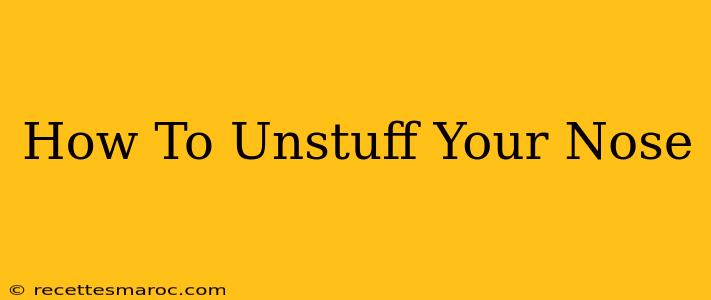A stuffy nose is incredibly frustrating. It makes it hard to breathe, sleep, and even taste food properly. Fortunately, there are many ways to unstuff your nose and find relief. This comprehensive guide explores various methods, from home remedies to medical treatments, to help you breathe freely again.
Understanding the Causes of Nasal Congestion
Before diving into solutions, it's important to understand why your nose is stuffy. Common causes include:
- The Common Cold: Viral infections are a leading cause of nasal congestion, often accompanied by other cold symptoms like coughing, sneezing, and sore throat.
- Allergies: Allergens like pollen, dust mites, and pet dander trigger an inflammatory response in the nasal passages, leading to stuffiness.
- Sinusitis: Inflammation of the sinuses can cause significant nasal congestion and pain in the face.
- The Flu: Influenza, a more serious viral infection, can also cause severe nasal congestion.
- Nasal Polyps: These benign growths in the nasal passages can obstruct airflow and cause chronic congestion.
- Deviated Septum: A crooked nasal septum can partially block one nasal passage.
- Dry Air: Low humidity can dry out the nasal passages, contributing to congestion.
Home Remedies for Nasal Congestion Relief
Many effective home remedies can provide quick relief from a stuffy nose:
1. Saline Nasal Rinse (Nasal Irrigation):
A saline rinse is a simple and effective way to flush out irritants and mucus from your nasal passages. You can use a neti pot or a squeeze bottle filled with a saline solution (salt and water). Make sure to use distilled or sterile water to avoid infections.
2. Steam Inhalation:
Inhaling steam can help loosen mucus and ease congestion. Simply boil some water, pour it into a bowl, and lean over it, draping a towel over your head to trap the steam. Add a few drops of eucalyptus oil or menthol for added relief (but always be cautious with essential oils and ensure they are appropriate for your situation).
3. Hydration:
Drinking plenty of fluids, especially water, helps thin mucus and makes it easier to clear from your nasal passages.
4. Elevating Your Head:
Sleeping with your head elevated on an extra pillow can help drain mucus and reduce congestion.
5. Warm Compress:
Applying a warm, damp compress to your forehead and sinuses can soothe inflammation and provide relief.
6. Humidifier:
Adding moisture to the air with a humidifier can help prevent nasal passages from drying out, reducing congestion.
Over-the-Counter Medications for Nasal Congestion
Several over-the-counter medications can help relieve nasal congestion:
- Decongestants: These medications, available as nasal sprays or oral pills, can help shrink swollen blood vessels in the nasal passages. However, overuse can lead to rebound congestion, so follow the recommended dosage carefully.
- Saline Sprays: Saline nasal sprays can help moisturize and clear the nasal passages.
- Antihistamines: If allergies are causing your stuffy nose, antihistamines can help reduce inflammation and relieve symptoms. Be aware that some antihistamines can cause drowsiness.
When to See a Doctor
While many cases of nasal congestion resolve on their own, you should see a doctor if:
- Your symptoms are severe or persistent.
- You have a high fever.
- You experience facial pain or pressure.
- You have difficulty breathing.
- You have green or yellow nasal discharge.
- Your symptoms worsen after a week of home treatment.
Preventing Nasal Congestion
Taking steps to prevent nasal congestion can significantly improve your quality of life. These preventive measures include:
- Practice good hygiene: Wash your hands frequently to avoid spreading viruses.
- Manage allergies: Identify and avoid allergens whenever possible.
- Stay hydrated: Drink plenty of water throughout the day.
- Avoid smoke and irritants: Exposure to smoke and other irritants can worsen nasal congestion.
This guide offers a comprehensive overview of how to unstuff your nose. Remember that the best approach depends on the underlying cause of your congestion. Always consult a doctor if you have concerns or your symptoms are severe. By understanding the causes and utilizing appropriate remedies, you can effectively manage your nasal congestion and breathe easier.

